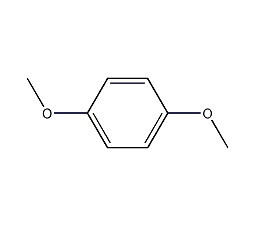
Structural formula
| Business number | 03YE |
|---|---|
| Molecular formula | C8H10O2 |
| Molecular weight | 138.16 |
| label |
p-Dimethoxybenzene, Hydroquinone dimethyl ether, Hydroquinone dimethyl ether, dimethylhydroquinone, Dimethylhydroquinone ether, Hydroquinone dimethyl ether, Dimethylhydroquinone, DMB |
Numbering system
CAS number:150-78-7
MDL number:MFCD00008401
EINECS number:205-771-9
RTECS number:CZ6650000
BRN number:774605
PubChem number:24901038
Physical property data
1. Physical property data:
1. Properties: white flaky crystals with clove smell.
2. Density (g/mL, 25/4℃): 1.053
3. Flash point (℃): 125
4. Melting point (℃ ): 58
5. Boiling point (ºC): 212.6
6. Boiling point (ºC, 2.67kpa): 109
7. Solubility: soluble in Ethanol, ether and benzene are insoluble in water.
8. Relative density (20℃, 4℃): 1.038355
Toxicological data
2. Toxicology data:
1. Acute toxicity: Rat oral LD50: 3600 mg/kg;
Mouse oral LD50: 4 gm/kg;
Mouse abdominal LD50: 100 mg/kg.
Ecological data
3. Ecological data:
Other harmful effects: This substance may be harmful to the environment, and special attention should be paid to water bodies.
Molecular structure data
1. Molar refractive index: 39.60
2. Molar volume (cm3/mol): 137.4
3. Isotonic specific volume (90.2K ): 320.6
4. Surface tension (dyne/cm): 29.6
5. Polarizability (10-24cm3): 15.70
Compute chemical data
1. Reference value for hydrophobic parameter calculation (XlogP): None
2. Number of hydrogen bond donors: 0
3. Number of hydrogen bond acceptors: 2
4. Number of rotatable chemical bonds: 2
5. Number of tautomers: none
6. Topological molecule polar surface area 18.5
7. Number of heavy atoms: 10
8. Surface charge: 0
9. Complexity: 73.3
10. Number of isotope atoms: 0
11. Determine the number of atomic stereocenters: 0
12. Uncertain number of atomic stereocenters: 0
13. Determine the number of chemical bond stereocenters: 0
14. Number of uncertain chemical bond stereocenters: 0
15. Number of covalent bond units: 1
Properties and stability
1. Stable under normal temperature and pressure.
2. Incompatible materials: strong oxidizing agents.
3. Exist in mainstream smoke.
4. Naturally found in green tea, peppermint oil, and papaya.
Storage method
Seal the package and store in a dry and cool place, avoid sunlight.
Synthesis method
1. Obtained from the methylation of hydroquinone with dimethyl sulfate or methyl chloride.
2. Obtained from the reaction of dimethyl sulfate and hydroquinone in the presence of alkali.
Purpose
1. GB 2760-96 stipulates that edible spices are allowed to be used. Mainly used for preparing nut flavors.
2. This product is an organic synthesis intermediate, used in the production of the drug methoxyamine hydrochloride, the dye black salt ANS, etc. It is also used as a fixative, used in daily chemicals, to prepare food and tobacco flavors; it can also be used as an anti-corrosion agent for plastics and coatings.
3. Used as an organic chemical intermediate to produce the drug methoxyamine hydrochloride, the dye black salt ANS, etc., and also used as a fixative.
4. It can also be used for the synthesis of spices.

 微信扫一扫打赏
微信扫一扫打赏

